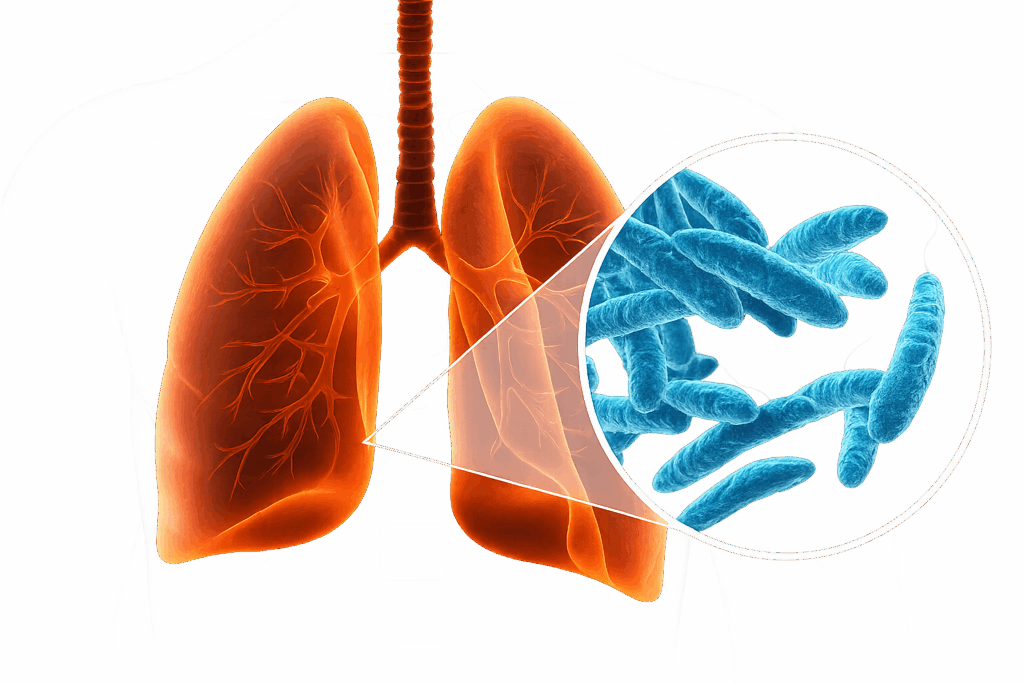- Amman, King Hussain Park, Jordan
- +(962) 000-0000
- info@curafile.com
Legionnaires’ Disease
- Home
- Lungs and Breathing
- Legionnaires’ Disease
Legionnaires’ disease is a serious type of pneumonia caused by Legionella bacteria. The disease got its name when a group of people at an American Legion convention became ill with this type of pneumonia.
Legionella is found naturally in freshwater, such as lakes and rivers. It can also be found in soil. But people usually only get sick from it when if it grows and spreads in man-made water systems. These systems can include hot tubs, fountains, and the plumbing systems of large buildings, such as hotels or nursing homes.
Legionella can also cause Pontiac fever. This is a milder, flu-like illness that doesn’t infect your lungs.
The symptoms usually show up 2 to 14 days after you were exposed to Legionella bacteria. Most of the symptoms are similar to those of other types of pneumonia. But Legionnaires’ disease may also cause gastrointestinal symptoms and mental changes.
The symptoms of Legionnaires’ disease may include:
- Cough
- High fever
- Chills
- Headache
- Chest pain
- Shortness of breath
- Fatigue
- Nausea and vomiting
- Diarrhea
- Confusion
You can get the infection by breathing in mist or small drops of water that contain the bacteria. The mist may come from hot tubs, showers, or large building air conditioning units.
You usually can’t get infected by drinking water that contains the bacteria unless you aspirate it (accidentally breathe the water into your lungs). The bacteria don’t spread from person to person. Disease outbreaks happen when many people are exposed to the same water source that contains the bacteria.
You can lower your risk of getting Legionnaires’ disease if you:
- Clean all your water-related devices regularly. This could include portable humidifiers, water heaters, air conditioners, and nasal rinses.
- If you haven’t used your faucets and showerheads for a week or more, flush them by letting the hot and cold faucets run for at least two minutes before use.
- Avoid exposure to water sources such as decorative foundations or hot tubs if you don’t know how well they are maintained.
- Use windshield cleaner in your wiper fluid tank in your car instead of water.
- Ask about how well your buildings’ water systems are maintained.
If you have Legionnaires’ disease, you will likely need care in a hospital. The treatment is with antibiotics. Most people will recover, especially if they were healthy when they got the disease. Getting treatment early can increase the chances of getting better.
References
Han MK, Lazarus SC. COPD: diagnosis and management. In: Broaddus VC, Ernst JD, King TE, et al, eds. Murray and Nadel’s Textbook of Respiratory Medicine. 7th ed. Philadelphia, PA: Elsevier; 2022:chap 64.
Masson VK, Boas SR. a1 -antitrypsin deficiency and emphysema. In: Kliegman RM, St. Geme JW, Blum NJ, et al, eds. Nelson Textbook of Pediatrics. 22nd ed. Philadelphia, PA: Elsevier; 2025:chap 442.
Tejwani V, Stoller JK. The spectrum of clinical sequelae associated with alpha-1 antitrypsin deficiency. Ther Adv Chronic Dis. 2021;12_suppl. PMID: 34408829 pubmed.ncbi.nlm.nih.gov/34408829/.

Who is more likely to develop Legionnaires' disease?
Most healthy people who come in contact with the bacteria do not become sick. You are more likely to develop an infection if you:
- Are over the age of 50
- Are a current or former smoker
- Have a chronic (long-lasting) disease such as diabetes or kidney failure
- Have a chronic lung disease such as COPD or emphysema
- Have a weakened immune system due to a disease such as HIV or cancer or are taking medicines that suppress your immune system
- Live in a long-term care facility
- Have recently stayed in a hospital or had surgery requiring anesthesia
What other problems can Legionnaires' disease cause?
Legionnaires’ disease can cause life-threatening complications such as respiratory failure, kidney failure, and sepsis.
About 1 out of every 10 people who get sick with Legionnaires’ disease will die from complications of the illness.
How is Legionnaires' disease diagnosed?
To find out if you have Legionnaires’ disease, your health care provider will probably order a chest x-ray to see if you have pneumonia. If you do have it, lab tests such as a urine or sputum test can check for the Legionella bacteria. Your provider may also order a blood test to see if you have been exposed to the bacteria.
Related Topics
Good Habits You Should Know
Bad Habits You Should Know
-
Find a clinic near you
-
Call for an appointment!
-
Feel free to message us!
About Us
Curafile is the biggest Healthcare Curated Network Globally that serves citizens, service providers in B2C and B2B directions.
- Al Hussain Business Park
Amman, Jordan
Additional Links
- test October 20, 2025
- Hello world! October 7, 2025
- Many doctors use wrong test to diagnose kids food allergies February 12, 2017
- Rising cost of diabetes care concerns patients and doctors January 15, 2017
- Can breakfast help keep us thin? Nutrition science is tricky January 5, 2017
